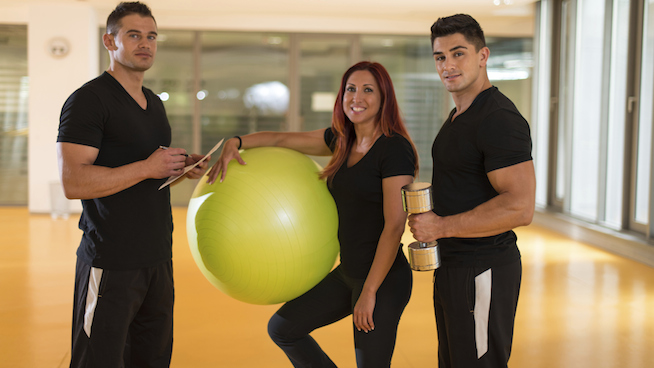7 Things to Consider When Choosing a Personal Trainer
You’ve resolved to achieve your fitness goals, and now you want to hire a personal trainer to help you create a plan, teach you how to perform the exercises safely and properly, and present training variations to boost your metabolic rate.
Here are some factors to think about before you choose a trainer.
1. Location
Where do you want to train? Do you prefer to exercise in a gym (a more public setting), a fitness studio (with a one-on-one approach), or in the privacy of your own home (following an online fitness plan)?
2. Certifications
Check out your potential trainer’s certifications. A good trainer will have current certification from various associations, such as the American Council on Exercise (ACE), the YMCA and the Canadian Society for Exercise Physiology (CSEP). Some will also have specialized certification in areas like sports nutrition or strength training. Working with a personal trainer who has earned certifications is very important, since he or she will know more about anatomy and muscular function, and will have a better understanding of the body’s movements and how to prescribe safe and effective exercises.
RELATED: Give Yourself a Career Advantage With Fitness Certifications Before Earning a Degree
3. Expertise
Does your trainer have an area of specialization? Fat loss? Sports performance? Pre-/Post-Natal Fitness? Based on your goals, you can find a trainer with expertise who will benefit you. Research online to learn their areas of specialization and gain a better understanding of their training approaches. Also, find out about the trainer’s own fitness accomplishments—in races, competitions and publications—and see if he or she fits your needs.
4. Personality
Are you looking for a drill sergeant or a cheerleader? Talk to the trainer and watch him or her training other clients to see if his or her personality will motivate you.
5. Cost
Some gyms have set rates across the board, and trainers at a fitness studio may charge different fees. The sessions can vary from 30 minutes to an hour. Come up with a realistic budget before starting your search and find out what options your trainer offers.
6. Philosophy
Ask the trainers how they prefer to work with clients, how they develop each fitness program, and what type of training they typically prescribe. Do they prefer exercise machines, cardiovascular machines, dumbbells, barbells or other equipment? What do they want to teach you, and what will you get out of working with them? Do they focus more on strict repetitive training or do they like to mix up their routines? Depending on what you like and the reasons why you want personal attention, your trainer’s philosophy should match your goals.
7. Precautions
Make sure the trainer you work with asks questions about your goals and health history. He or she should request to do a fitness assessment prior to beginning your training. This means they will pay more attention to you and customize a program tailored to your level and objectives.
Find out if they have insurance coverage in case of an accident, to know that your safety is protected at all times.
If a trainer who is working with you fails to address any pain or discomfort you experience during the exercises, this is a red flag. If you have any injuries or health conditions, mention them to your trainer and ask if he or she can recommend exercises to help your condition. Always look for reviews and feedback from other clients who have worked with your trainer.
RELATED: Wish List: Personal Training Session
[cf]skyword_tracking_tag[/cf]RECOMMENDED FOR YOU
MOST POPULAR
7 Things to Consider When Choosing a Personal Trainer
You’ve resolved to achieve your fitness goals, and now you want to hire a personal trainer to help you create a plan, teach you how to perform the exercises safely and properly, and present training variations to boost your metabolic rate.
Here are some factors to think about before you choose a trainer.
1. Location
Where do you want to train? Do you prefer to exercise in a gym (a more public setting), a fitness studio (with a one-on-one approach), or in the privacy of your own home (following an online fitness plan)?
2. Certifications
Check out your potential trainer’s certifications. A good trainer will have current certification from various associations, such as the American Council on Exercise (ACE), the YMCA and the Canadian Society for Exercise Physiology (CSEP). Some will also have specialized certification in areas like sports nutrition or strength training. Working with a personal trainer who has earned certifications is very important, since he or she will know more about anatomy and muscular function, and will have a better understanding of the body’s movements and how to prescribe safe and effective exercises.
RELATED: Give Yourself a Career Advantage With Fitness Certifications Before Earning a Degree
3. Expertise
Does your trainer have an area of specialization? Fat loss? Sports performance? Pre-/Post-Natal Fitness? Based on your goals, you can find a trainer with expertise who will benefit you. Research online to learn their areas of specialization and gain a better understanding of their training approaches. Also, find out about the trainer’s own fitness accomplishments—in races, competitions and publications—and see if he or she fits your needs.
4. Personality
Are you looking for a drill sergeant or a cheerleader? Talk to the trainer and watch him or her training other clients to see if his or her personality will motivate you.
5. Cost
Some gyms have set rates across the board, and trainers at a fitness studio may charge different fees. The sessions can vary from 30 minutes to an hour. Come up with a realistic budget before starting your search and find out what options your trainer offers.
6. Philosophy
Ask the trainers how they prefer to work with clients, how they develop each fitness program, and what type of training they typically prescribe. Do they prefer exercise machines, cardiovascular machines, dumbbells, barbells or other equipment? What do they want to teach you, and what will you get out of working with them? Do they focus more on strict repetitive training or do they like to mix up their routines? Depending on what you like and the reasons why you want personal attention, your trainer’s philosophy should match your goals.
7. Precautions
Make sure the trainer you work with asks questions about your goals and health history. He or she should request to do a fitness assessment prior to beginning your training. This means they will pay more attention to you and customize a program tailored to your level and objectives.
Find out if they have insurance coverage in case of an accident, to know that your safety is protected at all times.
If a trainer who is working with you fails to address any pain or discomfort you experience during the exercises, this is a red flag. If you have any injuries or health conditions, mention them to your trainer and ask if he or she can recommend exercises to help your condition. Always look for reviews and feedback from other clients who have worked with your trainer.
RELATED: Wish List: Personal Training Session
[cf]skyword_tracking_tag[/cf]











